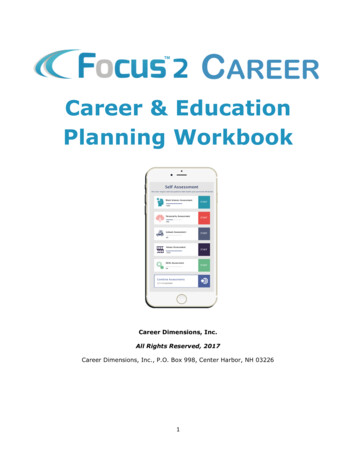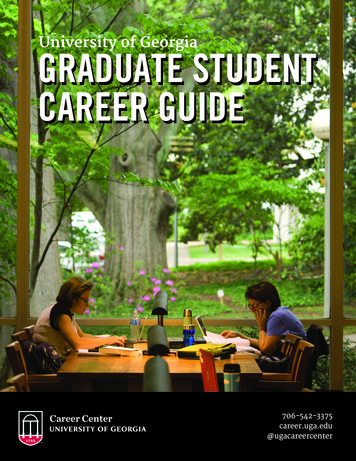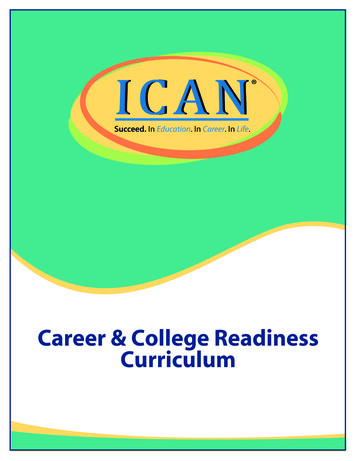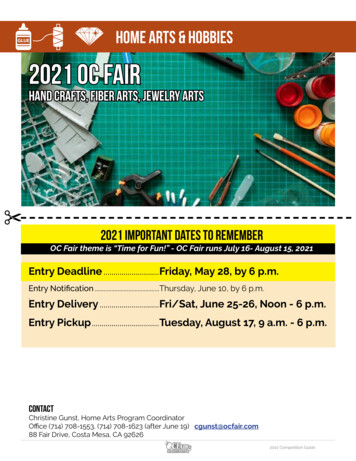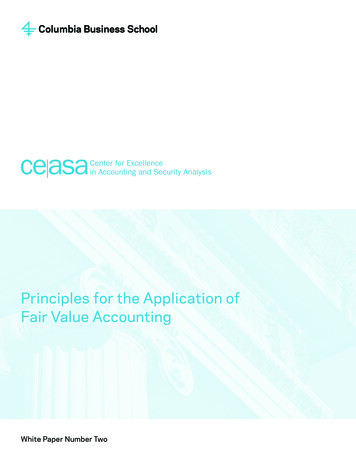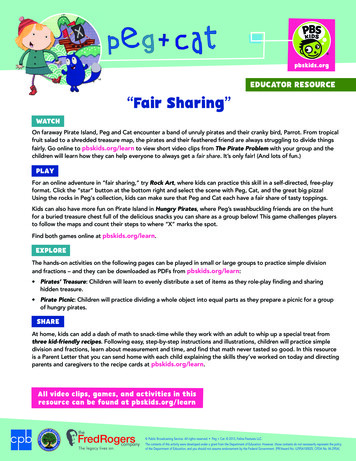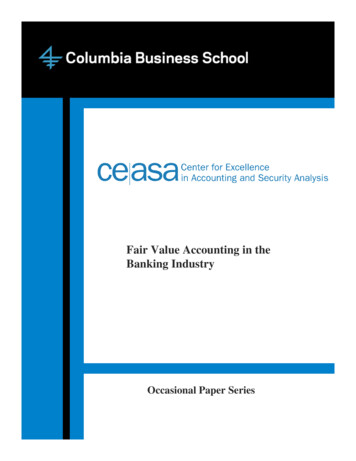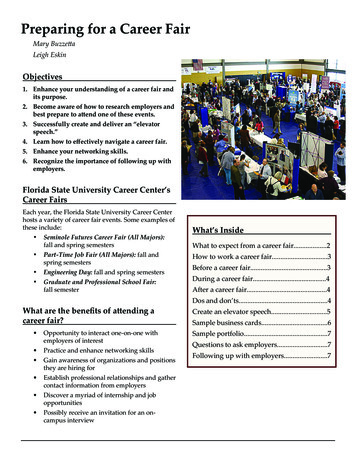
Transcription
Preparing for a Career FairMary BuzzettaLeigh EskinObjectives1. Enhance your understanding of a career fair andits purpose.2. Become aware of how to research employers andbest prepare to attend one of these events.3. Successfully create and deliver an “elevatorspeech.”4. Learn how to effectively navigate a career fair.5. Enhance your networking skills.6. Recognize the importance of following up withemployers.Florida State University Career Center’sCareer FairsEach year, the Florida State University Career Centerhosts a variety of career fair events. Some examples ofthese include: Seminole Futures Career Fair (All Majors):fall and spring semesters Part-Time Job Fair (All Majors): fall andspring semesters Engineering Day: fall and spring semesters Graduate and Professional School Fair:fall semesterWhat are the benefits of attending acareer fair? Opportunity to interact one-on-one withemployers of interest Practice and enhance networking skills Gain awareness of organizations and positionsthey are hiring for Establish professional relationships and gathercontact information from employers Discover a myriad of internship and jobopportunities Possibly receive an invitation for an oncampus interviewWhat’s InsideWhat to expect from a career fair.2How to work a career fair.3Before a career fair.3During a career fair.4After a career fair.4Dos and don’ts.4Create an elevator speech.5Sample business cards.6Sample portfolio.7Questions to ask employers.7Following up with employers.7
What to Expect From a Career FairWhat is a career fair?A career fair is an event that gives students andemployers a chance to meet one another, establishprofessional relationships, and discuss potential joband/or internship opportunities.Many employers from a variety of industries attend,and there are both general and specialized career fairevents. For example, the Seminole Futures CareerFair, held every fall and spring semester, is a generalcareer fair in which employers are seeking to hirestudents from a variety of different majors. On theother hand, the Education & Library Career Fair,while open to any major, is a specialized event inwhich employers attending are seeking studentsmajoring in Education, Library and InformationStudies, or other related majors.What is most unique about a career fair is thatemployers choose to attend these events in order tomeet and recruit excellent candidates. In many cases,recruiters are actual Florida State graduates and areexcited to come back to FSU and recruit students fromtheir alma mater.Who can attend a career fair?There is a common misconception that only juniorsand seniors should attend a career fair. However,all classifications (including freshmen, sophomores,juniors, and seniors) can benefit from attending acareer fair.By attending a career fair, freshmen can exploreopportunities in their field of interest, as well as askquestions about internships and/or job opportunities.Sophomores and juniors can utilize a career fair forthese same reasons. Seniors commonly attend careerfairs seeking full-time job positions and can activelynetwork with recruiters during these events.On another note, all majors can attend any careerfair. Employers are typically interested in meetingstudents from a variety of different academicbackgrounds. In addition, both undergraduate andgraduate students are likely to benefit from attendingthese events. Finally, alumni and communitymembers are also welcome to attend all FSU careerfairs.2What can I expect from attending a careerfair?A common misconception of attending a career fairevent is that students/community members oftenbelieve that they should leave the event with aninternship and/or job opportunity in hand. Althoughthis may happen, it is very rare. The purpose of acareer fair is to enhance your job search network andlearn more about organizations hiring FSU students.What other opportunity will you have for employersto come straight to you? Use this opportunity topresent yourself favorably, gather useful information,and establish new contacts! Your small investmentof time and effort might very well turn into anopportunity you would not have had otherwise.Preparing for a Career Fair
How to Work a Career FairBefore a career fair1. Create a strong résumé. Visit The Career Center to have your résuméreviewed, and be sure to have multiplecopies (minimum of 20) printed onprofessional résumé paper before the careerfair. Decide if you need more than oneversion of your résumé, depending on yourjob target(s).2.Develop and practice an elevator speech. Developing an elevator speech islikely one of the most important componentsin preparing for a career fair. Prepare an elevator speech before the day’sevent, but also practice it with a careeradvisor at FSU’s Career Center.5. Attend a career fair preparation workshop. Check the FSU Career Center website forupcoming workshop events athttp://www.career.fsu.edu/calendar.6. Consider creating a professional business card(see page 6 for examples). TIP: This is optional and not required.7.Consider purchasing a professional businessportfolio to help keep your items organized(see page 7 for an example). Purchase a business portfolio for under 20.00 at any office supply store. Include copies of your résumé, businesscards, and employer literature that youwill gather while attending the event. Use the space inside your business portfolioto take notes. Identify resources on page 5.3.Research employers and objectives for what youplan to accomplish during the career fair.8. Refer to career.fsu.edu/seminolelink/ forinstructions on how to obtain SeminoleLinkPlus! services. Identify which employers you want to talkto BEFORE the event by researching theorganizations attending. Update your profile and professionaldocuments prior to attending the career fair,even if you already have Plus! services. Research and follow up with attendees.The FSU Career Center keeps an updated listof attendees on its website(career.fsu.edu/fairs). TIP: If you have properly prepared forthe event, you will have more time to focuson representatives from organizations ofinterest.3.Prepare to dress for success at the event. View the “Dressing to Impress” guidelocated at career.fsu.edu/advising/guides.cfm. Keep in mind that 55% of any interactionis visual, meaning it is not always what yousay but how you look when you say it.Sign up for SeminoleLink Plus! services. TIP: It is always best to have access to Plus!services prior to attending a career fair event.This way, if employers request that youfollow up for on-campus interviews, thenyou have already begun the process!9.Consider your online presence. Update or create a LinkedIn profile. Clean up your Facebook profile and putyour settings on private. Address all “digital dirt.” Wear a two-piece suit, if possible. Usually adark color is preferred. Use simple accessories and closed-toedshoes for females. Choose a conservative tie. Avoid excess cologne and/or perfume.Preparing for a Career Fair3
How to Work a Career Fair (cont.)During a career fairAfter a career fair1. Leave your cell phone and any other items thatmay cause distraction (e.g., backpack, skateboard)in your car.1.2. Arrive early to avoid long lines.Follow up with employers! If, for example,an employer expressed interest in looking at yourwebsite, be sure to email the URL link like yousaid you would.2. Write letters to employers, preferably that sameFamiliarize yourself with the fair’s layout andday, thanking them for their time.location of organizations before entering thecareer fair event. (A program will be3. Be sure to check and sign up for on-campusprovided upon arrival.)interviews (with the FSU Career Center), whichmay be conducted with some organizations4. Be positive and confident!following the career fair. Sixty percent of an individual interactioninvolves nonverbal communication.This includes a firm handshake, eyecontact, nodding your head, and mostDO:importantly - SMILING! Leave your backpack (or any unneccessary TIP: It may be helpful to visit with youritems) in your car if you can.“favorite” employer LAST. Use otheremployers on your list to practice and Bring plenty of copies of your résumé.become more comfortable in introducing Develop a strong elevator speech.yourself. Use strong non-verbal communication when5. Ask thoughtful questions!interacting with employers (handshake). See page 7 for sample questions to ask an Ask questions.employer. Know about the employer you are visiting6. Leave your résumé and if applicable, businesswith.card, with each representative that you speak Dress professionally.with. Follow up. Oftentimes, employers at a career fair3.will not take a paper copy of your résumésimply because all documents have tobe submitted electronically. Rather,employers may encourage you to “applyonline” - do not be discouraged by thisrequest.7. Request a business card from the employer(or contact name if employer is not handing outbusiness cards).8. Take notes (in your business portfolio ifneccessary).9.Be open-minded. Most employers are recruitingstudents from all majors. Therefore, it isimportant to be confident in your major and focuson the skills you have to offer an employer!4DO NOT: Bring a cell phone in with you to the event.Leave this in the car. Ask an employer “What does yourorganization do?” or “What positions areyou hiring for?” This indicates that youhave not done your homework and are notinvested in them. Ask questions about salary and employerbenefits. Collect free stuff when you are not offered. NOT ask questions!Preparing for a Career Fair
How to Create an Elevator SpeechWhen introducing yourself to a potential employer,you should be able to quickly describe your careergoals, core strengths, and relevant experiences. Thispersonal commercial is often called an “elevatorspeech” simply because, if you were to step into anelevator with the CEO/President of an organizationyou were interested in working for and had 30seconds to tell this employer enough information tomake them want to hire you, what would you say?In giving your elevator speech, it is best to connectyour personal experiences and qualifications with theorganization and describe why you are a good “fit.”Your elevator speech should includethe following elements Your name and present status/situation Brief overview of your unique experiences,skills, and qualifications A connection between what you can offerand what you know about them Pertinent questions that the employer canrespond toUse the lines below to begin to answer questions that will help you construct your elevator speech.1. Who am I? (Include your full name, current status as an FSU student, major/minor)2. What do I have to offer? (Include unique experiences here - previous work experience, student.organization involvement, volunteer work, internships)3. Why am I interested in your organization (or this industry)? (Use this opportunity to demonstrate thatyou have done your research)4. What do I have to offer and how am I a good “fit” with your organization? (Use this as a summarystatement)5. Questions I have for the employer. (Best to always end with a question - see page 7 for samplequestions) TIP: It is important that you practice delivering your elevator speech to a recruiter before attending thecareer fair. The more you practice, the more comfortable you will feel. Meet with a career advisor at theFSU Career Center to receive feedback on your elevator speech.Preparing for a Career Fair5
Sample business cardsImage courtesy of Target CopyIt is typically best to include thefollowing information on a professionalbusiness cardOptional information to include on aprofessional business card1. The university’s name (Florida State University)2. A personal and/or professional website (includingLinkedIn)2.Your full name3. Your major and/or minor (e.g., Bachelor of Sciencein Hospitality Management)4.Contact information, including a professionalphone number and email1.Your address3. Student organization involvement (e.g., Senatorfor Student Government Association)4.Cumulative and/or major GPA5.QR codeSuggesions on where to create/purchasebusiness cards1. Any office supply store2.Copying and printing Target Copy6Preparing for a Career Fair
Sample portfolio TIP: The FSU Career Center collects businesscards from every career fair attendee. Ifyou forget to ask for a business card oran employer is not handing themout, then you can access this informationthrough SeminoleLink.2.Inquire about on-campus interviews.3.Complete the online application process, ifrequired.4.Send a thank you note - preferably that same day. See Guide to “Writing Effective Letters”under the Interview Appreciation Lettersection, career.fsu.edu/advising/guides.cfm.Possible questions to ask employersQ. What are common career paths within yourorganization?Q. What kind of training programs do you have fornew hires?Tips for following up with an employerFollow-up is a critical part of attending a career fairevent. Here are a few suggestions:1.Request the recruiter’s business card. Ask for a contact name and email if therecruiter is not handing out a business card. DO NOT be discouraged if an employeris not handing out business cards.Keep in mind, recruiters travel to severaluniversities across the United States andmay prefer not to distribute their contactinformation to every individual. This is whyit is important to ask appropriate questionsabout the hiring process, obtain a contactname, and be sure to follow up. Follow the instructions given to you bythe employer. For example, if an employerencourages you to apply online, then be surethat you submit your application onlinewithin the next 2 days. Remember, youare likely going to leave your résumé and/orbusiness card with the employer. Therefore,they will be looking for yourapplication online.Preparing for a Career FairQ. What qualities and/or characteristics do successfulcandidates possess?Q. What is the organizational culture like?Q. What suggestions would you have for a studentin their year in school? How can I makemyself better prepared for the world of work?Q. Are there courses that I should take that will helpme in your industry?Q. How do you enjoy working for this organization? TIP: It is important not to solely rely onthese sample questions. Be sure tothoroughly research the organization anddevise 2-3 questions of your own.*Attending career fairs can be the perfect wayto explore your future and start thinking aboutemployers and jobs of interest. The purpose ofattending a career fair is to enhance your job searchnetwork. Simply attending a career fair is not enough;you must strategically navigate the fair and do yourresearch on employers before attending the event.It is important to adequately prepare for this event,which includes preparation before, during, and aftera career fair. Remember, you have a lot to offer anemployer. Best of luck in your career fair experience!7
Alternative Format Available.Revised 10/13.850.644.6431 career.fsu.edu
3. Familiarize yourself with the fair’s layout and location of organizations before entering the career fair event. (A program will 3. Be sure to check and sign up for on-campus be provided upon arrival.) 4. Be positive and confident! Sixty percent of an



